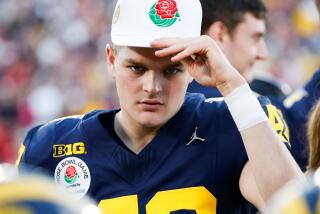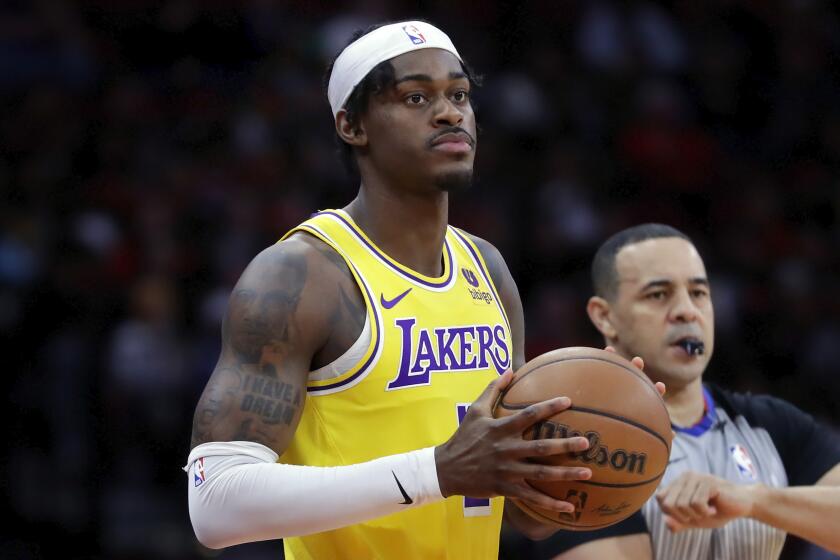A Disjointed Career : Knee Injury Turned Rose Bowl MVP Mark Brunell Into a Backup, but Now He’s the Starting Quarterback for Washington Again
- Share via
SEATTLE — This is Mark Brunell’s right knee. I’m the one with the scar. I got it in an operation Mark had to have after he tore a ligament in me in practice 19 months ago. That was right after he won the Rose Bowl MVP trophy as a sophomore quarterback for the Washington Huskies. We were really standing tall then.
Anyway, after I got hurt, Mark wasn’t sure when we would walk again. I began wearing a brace and I started feeling better. But Mark was a mess. Would he play again? Would he get his start -
ing job back? I tell you, it has been rough, but I think everything is all starting to even out now. I know Mark has changed since I got hurt. Maybe he’s even better than before , maybe because I got injured. He has more than two legs to stand on now.
I’ve learned a lot from my knee.
--Mark Brunell
The once and possibly soon-to-be-again quarterback of the Rose Bowl champion wore a light jacket, jeans, tennis shoes and a baseball cap to ward off the dreary weather outside the athletic department building at the University of Washington.
The wind blew heavy, wet snowflakes went across the campus, and the sky was the color of a bathtub ring. It was the kind of weather perfectly suited either for sinking into a deep depression or for taking a final exam, which is what Mark Brunell had done.
A history major from St. Joseph High in Santa Maria, Brunell’s last final was completed, and he could now concentrate on the Rose Bowl, where he could at last be sure of one thing in his storybook-turned-horror-story career: School is indeed out.
History and Brunell’s right knee have taught us that life follows a certain cycle. You’re up, you’re down, you’re up again. Hey, it’s a quarterback’s lot. And in Brunell’s case, he didn’t know how good it was to be back until he was gone for a while.
“What’s happened to me, it’s not a loop, it’s more like a roller coaster,” said Brunell, who will direct the Huskies against Michigan in the Rose Bowl. “I think I’ve grown up. I’ve learned a lot from my knee.
You know, (being injured) put everything in perspective. So I am thankful.
“Some guys go through knee injuries and they’re done, they can’t get their speed back, they can’t get their confidence back. Sure, I would love to know what kind of quarterback I would be if I had that extra year back when I was hurt. But then again, I don’t know if I would be the same person as I am now, learning how to battle back from adversity and getting through tough times.”
There didn’t seem to be many difficult times on the horizon for Brunell coming out of the Rose Bowl on Jan. 1, 1991. He was the Husky quarterback in a 46-34 victory over Iowa, the highest-scoring Rose Bowl game ever, and was voted the most valuable player after passing for two touchdowns and running for two more.
That was the high point. A lot has changed for Brunell since that day at practice in the spring of 1991 when teammates Steve Emtman and Donald Jones collided with Brunell’s knee. As he hit the ground, Brunell knew the message his knee was sending to his brain was not good.
“I didn’t hear anything, any pops or anything like that, but I knew I was hurt bad,” Brunell said.
He was. Doctors repaired the medial collateral ligament in Brunell’s right knee, but they also found damage to the anterior cruciate ligament, the major stabilizing ligament in the knee, and had to reconstruct it.
“I learned a lot from the injury,” he said. “Football doesn’t last forever, obviously, and at one point I was at the top of my athletic career, beyond any of my dreams, and now I’m at the lowest, lying on the ground, screaming in pain.
“Obviously, it’s an emotional ride. You always think the guys that hurt their knees, they are the other guys. It doesn’t happen to you, especially quarterbacks, especially at your own practice. But it happened. And it was just a matter of how I was going to deal with it.”
Brunell dealt with it by tackling rehabilitation with a vengeance. Once he got rid of his cast, Brunell spent hours running stairs, swimming, running and lifting weights. David Brunell, baseball coach and athletic director at St. Joseph, said his son realized it was the only way if he wanted to play football again.
“At first, he thought, ‘Why me?’ because he had everything going for him, so, ‘Why did this happen to me?’ ” the elder Brunell said. “So he was spending five or six hours a day in rehab. The odds were against him because of the severity of his injury. So many do not return. He went after it and proved most wrong.
“If you want to call it toughness or whatever, that injury made him as tough as you can be.”
Brunell wound up fooling everyone. He made it back to the team in five months and was in uniform. The only problem was, by that time his job was gone.
Coach Don James had handed the quarterback position to Billy Joe Hobert, which meant that the reigning most valuable player in the Rose Bowl was nothing more than a backup with a knee brace. Actually, it was hard to argue with James’ decision, especially because the Huskies went 12-0 in ’91 and finished with a 34-14 victory over Michigan last Jan. 1 in the Rose Bowl, where Hobert was chosen as one of the game’s most valuable players.
“I felt that we had a very even fall camp, but I knew going in that (Hobert) was going to get the job,” Brunell said.
James said he sat down with Hobert and Brunell and outlined his plan to dole out playing time. Basically, what James told his quarterbacks was that Hobert would start, but both would see action.
“I thought we could win with either one of them,” James said.
He was correct.
Because it’s not very smart to bench an undefeated quarterback, James began this season with Hobert starting and Brunell backing up. But even with the Huskies 4-0 on their way to 5-0, with Hobert struggling against Cal in what would be victory No. 5, James yanked him.
In trotted Brunell, who led the Huskies on two touchdown drives during the third quarter to break a 7-7 tie that ended up a 35-16 victory. Brunell finished with four completions in 11 attempts for 83 yards, but he also had a 37-yard run.
Looking back, James said it probably paid to be philosophical.
“We’ve known all our lives that sometimes highs and lows come back to back,” James said. “I guess Mark is a perfect example.”
James credited Brunell’s parents for their influence on his coping with what could have been a career-ending knee injury.
“He came in with a lot of character,” James said. “He was solid.”
The job was Brunell’s for good the next week against Oregon, but that doesn’t mean he never looked back. Actually, Brunell often looks back, because remembering where he has been helps make some sense of where he is now.
Part of what Brunell thinks about is Hobert, the fallen star quarterback. Hobert was declared ineligible in connection with accepting a $50,000 loan based in part on his potential earnings in the NFL, which would be a violation of NCAA rules.
“I kind of feel for the guy,” Brunell said. “Sure he made a bad decision, he made a mistake, but it’s unfortunate. He’s been such a vital part of this team, I think it’s kind of difficult for us. It’s still kind of damaging to us.”
There is a great deal of damage control going on these days in the Washington football program, where stories detailing allegations of improprieties seem to compound daily. “Distractions” is what Brunell calls the reports. And as a result of his injury and the twisted road he had to follow back to the Rose Bowl, Brunell said he is now able to put such distractions into perspective.
His wife, Stacy, and 7-month-old daughter, Caitlin, form a new set of priorities at home. On the field, there’s this business of the Rose Bowl and maybe, he hopes, an NFL career. Brunell is playing later in the Japan Bowl and the East-West Shrine Bowl to draw the attention of pro scouts. Some might note that he completed 57.7% of his passes this season, averaging a shade under seven yards per attempt, and saw only four passes intercepted in 11 games.
Back in the Rose Bowl, Brunell said he knows he is going to feel comfortable, not only because his knee might hold up better on the grass field. It’s like coming home--Santa Maria is a couple of hours away--and this is where it all started for him. Now it might be starting again. Call it a loop or a roller coaster, call it a game.
“I think all of us, we need to go through tough times because they make us strong,” he said. “Personally, I wouldn’t change a thing.”
More to Read
Go beyond the scoreboard
Get the latest on L.A.'s teams in the daily Sports Report newsletter.
You may occasionally receive promotional content from the Los Angeles Times.










